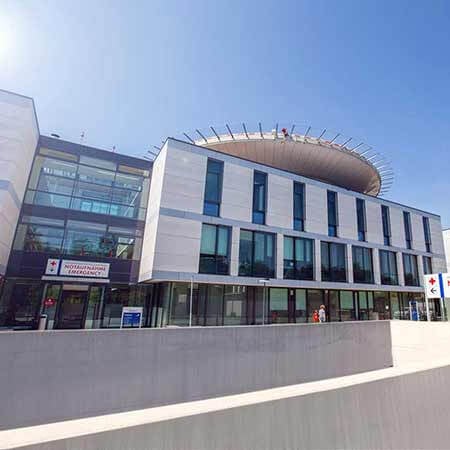Based on the type of cells from which Non-Hodgkin's lymphoma develops, it is divided into 2 types: B-cell and T-cell. There are many types of T-cell lymphoma. The treatment of lymphoma in Germany is selected individually, and first of all, it depends on the subtype of the tumor, the stage of the pathology, and the patient's general health and age. You can undergo treatment in Germany at an affordable price by booking a medical care program through the Booking Health website.
Content
- Treatment of T-cell lymphoblastic lymphoma
- Cutaneous T-cell lymphomas
- T-cell leukemia
- Treatment of other peripheral T-cell lymphomas
- Why is it worth undergoing treatment in Germany?
Treatment of T-cell lymphoblastic lymphoma
This disease develops in both children and adults. It can be considered as lymphoma or as a form of acute lymphoblastic leukemia, depending on which part of the bone marrow is involved in the pathological process. In a case of leukemia, the bone marrow is most affected.
Regardless of the final diagnosis, T-cell lymphoblastic lymphoma is a rapidly progressive disease and its treatment requires intensive chemotherapy. Although the lymphoma grows rapidly, the chances of a cure from chemotherapy are quite high if the tumor has not yet spread to the bone marrow at the time of diagnosis. If the bone marrow is already affected, it is still possible to cure the disease, but it becomes more difficult for doctors to achieve a complete cure. A high-dose chemotherapy treatment, followed by a stem cell transplant, is considered a good treatment option for younger patients with an advanced stage of the disease.
The first stage of treatment is very intensive and takes place in a hospital. Chemotherapy consists of a combination of several drugs that are administered systemically. Chemotherapy agents are also injected into the cerebrospinal fluid due to the risk of the cancer cells spreading to the brain and spinal cord.
At the time of detection of T-cell lymphoma, the tumor is usually large, so many patients develop tumor lysis syndrome. The malignant tumor is destroyed, and a large amount of toxins enter the bloodstream. As a result, the kidneys are overloaded. This can lead to impaired water and electrolyte metabolism and even kidney failure. Heart and nervous system problems can also occur. The doctors in German hospitals can successfully solve these problems, by using additional drugs that help to get rid of the effects of cancer cell destruction.
Many physicians in Germany prescribe maintenance chemotherapy for up to 2 years after the initial treatment, in order to reduce the risk of a recurrence.
Cutaneous T-cell lymphomas
The treatment regimen for lymphoma depends on the location of the tumor and the stage and type of the neoplasm. The patient's general health condition is also taken into account. German hospitals use both local and systemic methods.
Mycosis fungoides can be successfully treated with local methods in the early stages. The following treatment options are applied in Germany:
- phototherapy or PUVA therapy;
- local chemotherapy;
- corticosteroids;
- retinoids;
- local immunotherapy;
- local radiation therapy;
- total skin electron beam therapy (in cases with lesions on a large area of the skin).
If mycosis fungoides spread to other areas of the body, systemic treatment is required. German hospitals use therapy with retinoids and interferons, as well as carry out chemotherapy, biological therapy with monoclonal antibodies, and photopheresis. Not all of these methods are used simultaneously, however, one patient can receive several types of treatment at once.
Chemotherapy is usually used only when other treatments have failed. The doctors prescribe a single drug, but if the effect is insufficient, then they resort to polychemotherapy with several drugs.
Sezary syndrome is a disease which has usually spread beyond the skin at the time of diagnosis, so patients receive systemic treatment. It receives similar treatment to mycosis fungoides. A stem cell transplant is an additional treatment option if other treatments stop working.
Primary cutaneous anaplastic large cell lymphoma is usually limited to the skin and rarely spreads beyond it. This disease is usually cured successfully. Moreover, this is one of the few diseases in oncology that can disappear on its own, without any treatment. If treatment is required, the tumor will be removed surgically or destroyed with radiation. When the skin is damaged in several sites, both chemotherapy and targeted therapy will be performed.
Lymphomatoid papulosis has a favorable prognosis and often resolves on its own. Should treatment be required, then the local form will be treated with topical steroids and phototherapy. In cases of extensive skin lesions, local chemotherapy is used, or sometimes systemic chemotherapy with low-dose drugs.
Subcutaneous panniculitis-like T-cell lymphoma is a rare and not very dangerous disease that can be controlled with corticosteroids. If they are adequate, then the specialists resort to chemotherapy.
There are also many other subtypes of cutaneous T-cell lymphoma that are very rare. Treatment in Germany is effective for most of these diseases. The doctors in the specialized cancer centers have experience in the treatment of even rare diseases.
T-cell leukemia
This disease is also called adult T-cell lymphoma. The disease is caused by the HTLV-1 virus. There are 4 subtypes of this disease and each one requires a different approach to treatment.
Slow-growing T-cell lymphomas are often monitored without any treatment. If the disease begins to progress, then interferon and antiviral drugs are prescribed to suppress the causative agent of the pathology. When the skin is damaged, radiation therapy is carried out. In cases where the tumor has spread, CHOP chemotherapy is used.
The more aggressive forms of T-cell leukemia are treated with chemotherapy. The CHOP regimen is used. If the patient responds well to the treatment, this opens up the possibility of completely curing the tumor with high-dose chemotherapy and a bone marrow transplant. T-cell leukemia often affects the brain and spinal cord. Patients with such lesions require injections of drugs into the cerebrospinal fluid (intrathecal chemotherapy).
Treatment of other peripheral T-cell lymphomas
Oncologists also have to deal with many other types of lymphoma that are less common.
Angioimmunoblastic T-cell lymphoma develops rapidly and requires aggressive treatment. The initial treatment often includes steroid therapy. This quickly relieves the symptoms and slows down the progression of the disease. This type of treatment is followed by CHOP regimen chemotherapy. In addition to chemotherapy, hospitals in Germany use monoclonal antibodies in order to get a longer remission. However, a complete cure of the disease with standard chemotherapy is unlikely, so, after receiving the initial result, the patients who have a good health status are offered high-dose chemotherapy, followed by a stem cell transplant.
Extranodal NK/T-cell lymphoma is a rare tumor that grows from the cells of the immune system – natural killers. It is often limited to the nasal passages. The treatment of this involves the use of radiation therapy. Some patients require a combination of radiation therapy and chemotherapy. As a rule, the disease can be cured with these methods. If the lymphoma continues to progress, then the doctors resort to a stem cell transplant procedure.
Enteropathy-associated T-cell lymphoma is a tumor that primarily develops in the large or small intestine. CHOP regimen chemotherapy is considered the main treatment method. If the lymphoma is limited to a single area, then it can be destroyed with radiation therapy. Many patients require surgery because this type of T-cell lymphoma is often complicated by intestinal perforation (a hole in the intestinal wall). As a result, a part of the organ has to be removed. Operations are also performed to treat intestinal obstructions. If people with lymphoma do not respond to chemotherapy, a stem cell transplant usually becomes the next option of choice, which usually cures the disease.
Anaplastic large cell lymphoma grows rapidly and affects many lymph nodes. The main treatment method is chemotherapy. German hospitals use CHOP or CHOEP regimens, which can be combined with monoclonal antibodies. Some patients are considered candidates for radiation therapy. This type of T-cell lymphoma is successfully cured, especially in cases where the tumors contain a large amount of ALK protein. However, sometimes the disease recurs after a while, and in such cases, it is necessary to resort to a stem cell transplant. In Germany, this procedure is performed and gives good results, and also has a low risk of complications.
Breast implant-associated anaplastic large cell lymphoma is a rare tumor that develops 7-10 years after the placement of breast implants. It develops in a capsule, which is protective scar tissue that surrounds a foreign body. In German hospitals, such patients undergo surgical treatment: the implant is removed, along with the capsule. This is followed by chemotherapy, sometimes in combination with radiation therapy.
Why is it worth undergoing treatment in Germany?
T-cell lymphoma is a deadly disease, so its treatment requires the best doctors. Germany offers the services of highly qualified specialists, who successfully cope with even the most aggressive types of tumors. Although the cost of treatment in this country may be higher than in your native country, when making an appointment at the hospital through the Booking Health website, the prices will be reduced, so the difference will not be as significant. The cost of treatment in Germany will be reduced due to the lack of overpricing and additional coefficients for foreign patients.
Here are a few reasons for you to undergo your treatment in Germany:
- customized treatment depending on the subtype of your T-cell lymphoma;
- new drug therapy regimens, which include not only systemic chemotherapy, but also immunotherapy, targeted therapy, and intrathecal chemotherapy, if necessary;
- modern methods of radiation therapy, in which, complications are much less common;
- safe, minimally invasive operations through short incisions;
- stem cell transplant procedures, which help patients to cope with even the most severe cases of the disease;
- prices are lower than in the developed countries of North America and Asia, but the quality of the medical services is much higher.
When making your appointment for treatment through the Booking Health website, you can be sure that the cost of your treatment in Germany will not increase. If there are any additional costs, they will be covered by your insurance, so the price will remain the same for you. Please leave your request on our website: we will select the best hospital for you and take care of arranging your trip.
Authors:
The article was edited by medical experts, board certified doctors Dr. Vadim Zhiliuk and Dr. Sergey Pashchenko. For the treatment of the conditions referred to in the article, you must consult a doctor; the information in the article is not intended for self-medication!
Sources:
National Cancer Institute
Cancer Support Community
Medscape










